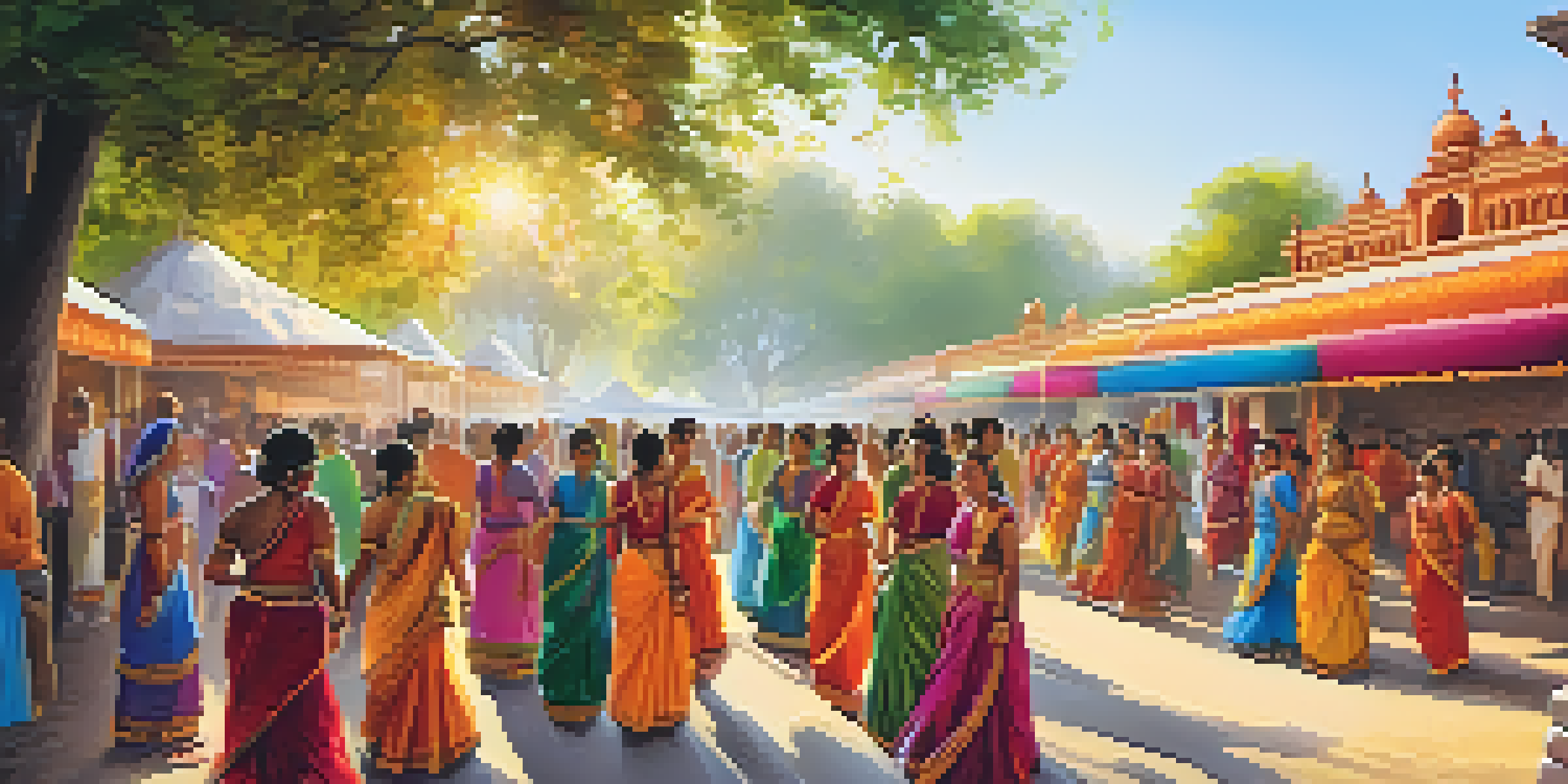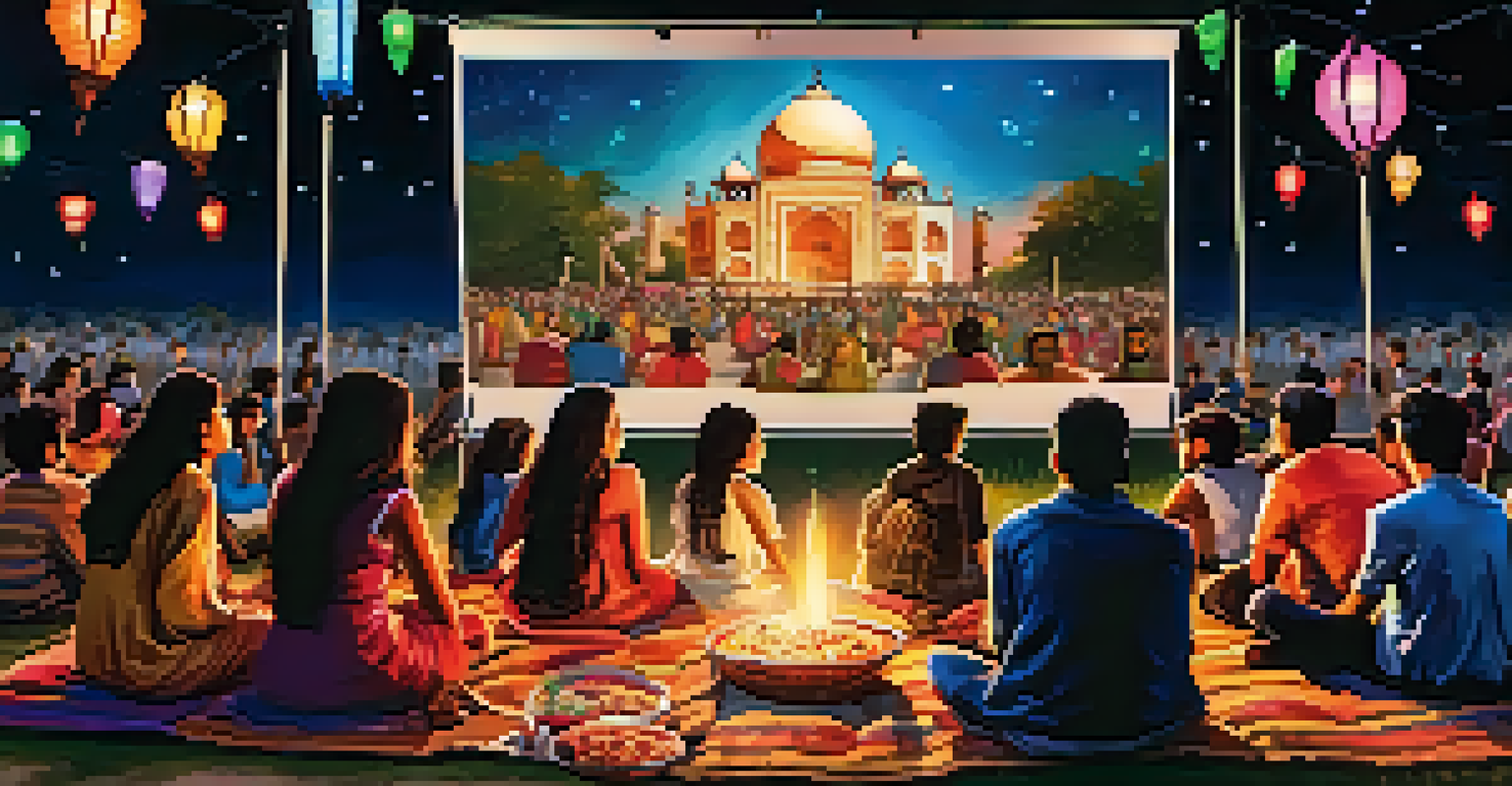India’s Role in Global Cultural Diplomacy Initiatives

Understanding Cultural Diplomacy and Its Importance
Cultural diplomacy involves the exchange of ideas, values, and traditions between countries to foster mutual understanding. It's more than just showcasing art or music; it’s about building relationships and a sense of community across borders. For countries like India, cultural diplomacy serves as a vital tool for enhancing international relations and promoting soft power.
Cultural diplomacy is a way to achieve peace and mutual understanding through the arts and cultural exchange.
In an era where globalization is at the forefront, cultural diplomacy can bridge gaps between nations. By sharing its rich heritage, India can present itself as a nation of diversity and inclusivity, attracting global attention. This approach not only shapes perceptions but also encourages dialogue and cooperation in various sectors.
Moreover, cultural diplomacy helps countries navigate complex political landscapes. When nations engage through culture rather than conflict, it creates a foundation for peace and stability. India’s commitment to these initiatives is evident in its various programs and partnerships worldwide.
India’s Diverse Cultural Heritage as a Diplomatic Tool
India boasts a rich tapestry of languages, religions, and traditions, making its cultural heritage a powerful diplomatic asset. Festivals, dance forms, and cuisine are just a few examples of how India shares its identity with the world. This diversity not only captivates but also invites curiosity and engagement from other nations.

For instance, events like the International Yoga Day showcase India’s spiritual practices globally, promoting wellness and mindfulness. Such initiatives foster a positive image of India while encouraging international participation. It’s a diplomatic strategy that emphasizes peace and harmony, values that resonate with many countries.
Cultural Diplomacy Builds Bridges
Cultural diplomacy fosters mutual understanding between nations by sharing ideas, values, and traditions.
Additionally, India’s film industry, particularly Bollywood, plays a significant role in cultural outreach. With millions of fans worldwide, Indian cinema has the power to transcend language barriers, making it an effective medium for cultural exchange.
Key Initiatives Showcasing India’s Cultural Diplomacy
The Indian government has initiated numerous programs aimed at enhancing cultural diplomacy. One notable initiative is the Indian Council for Cultural Relations (ICCR), which promotes cultural exchanges through scholarships and cultural festivals. This not only helps in creating goodwill but also strengthens academic ties with other countries.
The best way to find yourself is to lose yourself in the service of others.
Moreover, India participates in various international events like the Biennale Art exhibitions and the Frankfurt Book Fair, where it showcases its rich artistic talent. These platforms allow India to engage with global audiences, further promoting its cultural narrative.
Cultural festivals such as 'Namaste India' in the UK or 'India in the World' programs in various countries underline India's commitment to sharing its heritage. These initiatives invite collaboration and dialogue, reinforcing the idea that culture can unite us.
The Role of Indian Diaspora in Cultural Diplomacy
The Indian diaspora plays a crucial role in promoting cultural diplomacy. With millions of Indians living abroad, they serve as cultural ambassadors, sharing their traditions and values in their respective countries. This grassroots level engagement helps to create a positive image of India globally.
Diaspora communities often organize cultural events, food festivals, and art exhibitions that highlight India's diversity. These activities not only foster a sense of belonging among expatriates but also invite local communities to experience Indian culture firsthand.
India's Heritage as a Diplomatic Tool
India's diverse cultural heritage, from festivals to Bollywood, serves as a powerful asset for enhancing its global image.
Furthermore, the diaspora's contributions to various fields, such as technology and business, enhance India's reputation. Their success stories serve as a testament to India's talent and innovation, further bolstering its cultural diplomacy efforts.
India's Cultural Diplomacy in Conflict Resolution
Cultural diplomacy can also play a pivotal role in conflict resolution. By promoting understanding through cultural exchanges, India has worked towards easing tensions in various regions. Engaging in dialogue through art and culture can humanize relationships and pave the way for peaceful negotiations.
For instance, India's involvement in cultural initiatives in neighboring countries helps foster goodwill and mutual respect. By showcasing its diverse culture, India can counter negative narratives and build bridges where there might be division.
Moreover, India’s participation in international peacekeeping missions often includes cultural exchanges, highlighting its commitment to global peace. This multifaceted approach to diplomacy underscores the importance of culture in achieving lasting resolutions.
Challenges in India’s Cultural Diplomacy Efforts
Despite its efforts, India faces several challenges in cultural diplomacy. One major hurdle is the perception of its culture as monolithic, which can overshadow its diversity. Misunderstandings about India's traditions can hinder effective communication and engagement with other nations.
Additionally, balancing modernization with tradition poses a challenge. As India strives to present itself as a contemporary nation, it must ensure that its rich cultural heritage is not lost in the process. This delicate balancing act requires thoughtful strategies to promote both innovation and tradition.
Challenges in Cultural Outreach
India faces challenges in cultural diplomacy, including misconceptions about its diversity and competition from other nations.
Furthermore, competition from other countries in the realm of cultural diplomacy can dilute India's efforts. To stand out, India must continuously adapt and innovate its approaches while staying true to its values and traditions.
Future Prospects for India’s Cultural Diplomacy
Looking ahead, India’s cultural diplomacy holds immense potential for growth. As the world becomes more interconnected, the importance of cultural exchange will only increase. India can leverage its unique heritage to forge stronger international relationships and enhance its global standing.
Emerging technologies, such as digital platforms, can be utilized to reach wider audiences. Virtual cultural events and online collaborations offer innovative ways to engage with people globally, making Indian culture accessible to everyone, regardless of location.

Lastly, fostering youth engagement in cultural diplomacy will be crucial. By involving younger generations in cultural initiatives, India can ensure that its rich heritage continues to thrive and evolve, creating a new wave of cultural ambassadors for the future.